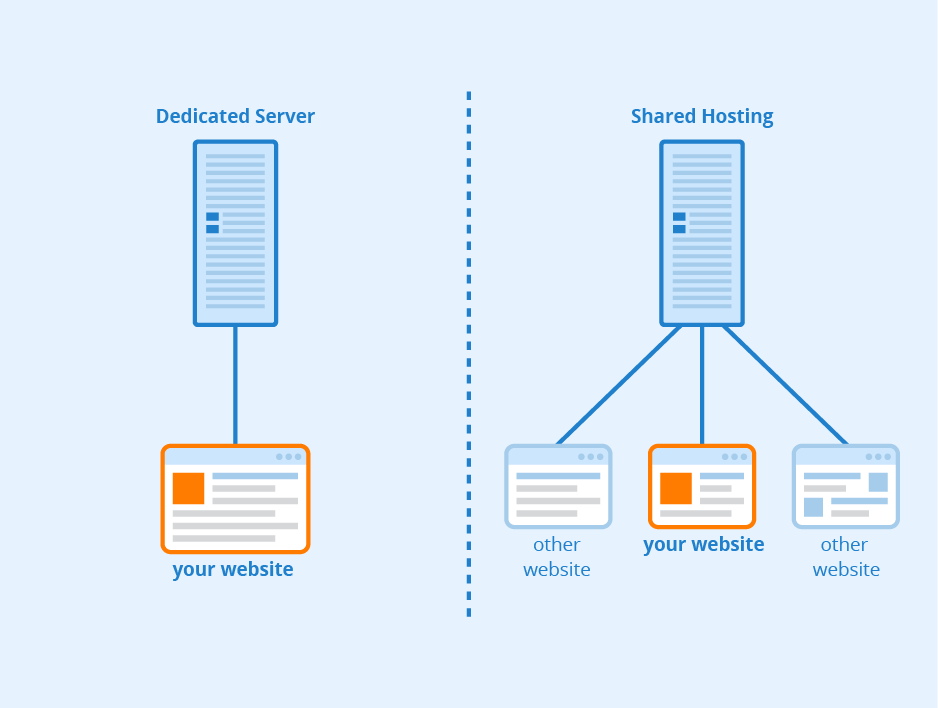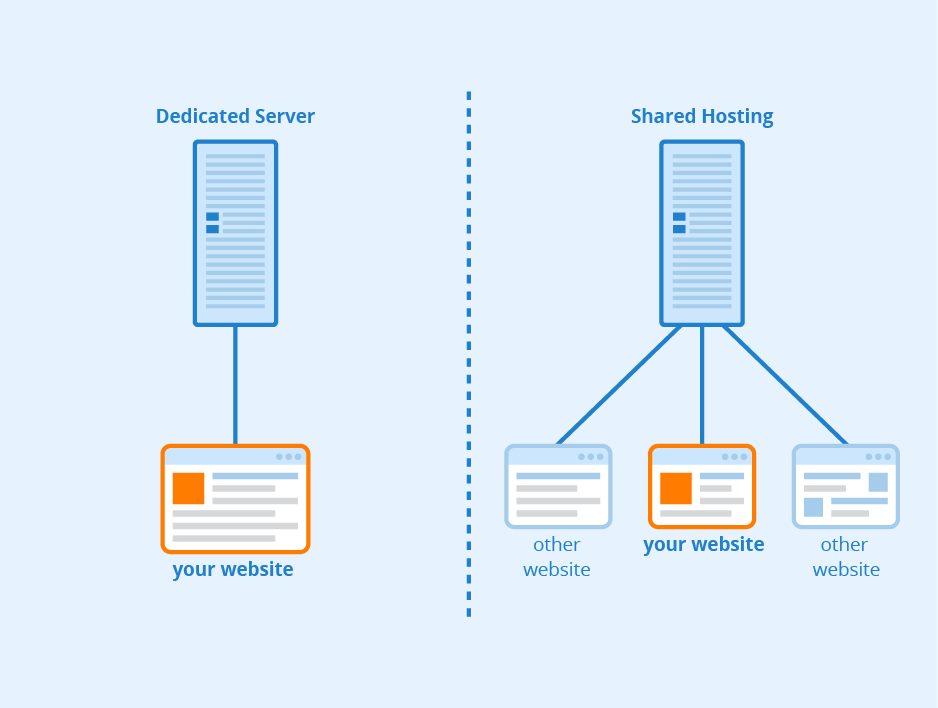When it comes to web hosting, understanding the difference between shared hosting and cloud hosting is crucial. Shared hosting is like living in an apartment building, where you share resources with other tenants. On the other hand, cloud hosting is like owning your own home with access to an entire neighborhood of resources. So, what exactly sets these two hosting options apart?
Shared hosting has been around for a long time and is typically the more affordable option for hosting your website. It involves multiple websites sharing the same server and its resources, which can sometimes result in slower performance if one website experiences high traffic or uses excessive resources. On the other hand, cloud hosting utilizes a network of virtual servers that work together to provide scalability, reliability, and maximum uptime. With cloud hosting, you have the flexibility to scale your resources up or down based on your website’s needs, ensuring optimal performance regardless of traffic fluctuations.
Shared hosting is a type of hosting where multiple websites share resources on a single server. It is cost-effective and suitable for small websites with low traffic. On the other hand, cloud hosting utilizes a network of servers to distribute resources, providing scalability and flexibility. It is ideal for websites with high traffic and demanding resource requirements. While shared hosting is limited in terms of performance and customization, cloud hosting offers better performance, reliability, and scalability. Choose based on your website’s needs.

Understanding Shared Hosting and Cloud Hosting
When it comes to hosting a website, there are various options available. Two popular choices are shared hosting and cloud hosting. While both options allow you to make your website accessible on the internet, there are significant differences between them. Understanding these differences can help you make an informed decision about which option is best for your website’s needs.
Shared hosting is a type of hosting where multiple websites share the same physical server and its resources. Each website has its own partitioned space on the server, typically in the form of a shared hosting account. The resources, such as CPU, RAM, and disk space, are shared among these websites.
On the other hand, cloud hosting is a type of hosting that utilizes a network of virtual servers to store and deliver website content. Rather than relying on a single physical server, cloud hosting uses multiple servers in different locations, which are interconnected to form a cloud infrastructure. This allows for greater scalability, flexibility, and reliability compared to shared hosting.
To delve deeper into the differences between shared hosting and cloud hosting, let’s explore the key factors that set them apart.
Pricing and Affordability
One of the most significant factors that differentiate shared hosting from cloud hosting is the pricing structure. Shared hosting is generally more affordable compared to cloud hosting. This is because the cost of server maintenance and resources is divided among multiple websites, making it a cost-effective option for those on a budget.
Shared hosting providers often offer different pricing plans with varying features and resource allocations. These plans are designed to cater to the needs of different types of websites, whether it’s a small personal blog or a medium-sized business website. The cost of shared hosting can range from a few dollars per month to around $30 per month, depending on the hosting provider and the features included.
Cloud hosting, on the other hand, tends to be more expensive than shared hosting. This is because cloud hosting offers more advanced features and benefits, such as better scalability, redundant storage, and high availability. Cloud hosting providers usually charge based on the resources consumed, such as the amount of storage used, data transfer, and the number of virtual servers required.
While cloud hosting may have a higher starting price compared to shared hosting, it offers greater flexibility and scalability, making it a viable option for websites with high traffic or fluctuating resource needs.
Performance and Reliability
When it comes to website performance and reliability, shared hosting and cloud hosting differ significantly.
Shared hosting can be a good option for small websites or websites with low traffic. However, as multiple websites share the same resources, the performance can be impacted if one or more of the websites experience high traffic or utilize a significant amount of resources. This is known as the “neighbor effect.” If a neighboring website experiences a sudden spike in traffic or consumes excessive resources, it can slow down the performance of other websites on the same server.
On the other hand, cloud hosting is designed to handle high traffic and provide better performance and reliability. With cloud hosting, your website is not tied to a single physical server. Instead, it utilizes the resources of multiple servers in the cloud. This allows for better load distribution and reduces the risk of a single point of failure. If one server in the cloud experiences an issue, your website can seamlessly switch to another available server, ensuring uptime and uninterrupted performance.
Cloud hosting also offers features such as load balancing and automatic scaling, which allow your website to handle sudden traffic spikes without any performance degradation. These features make cloud hosting an ideal choice for websites with high traffic volume or those that require constant availability.
Security and Control
When it comes to security and control, shared hosting and cloud hosting offer different levels of protection and customization options.
In shared hosting, the server and its resources are managed and maintained by the hosting provider. While providers implement security measures to protect the server and its users, the level of control and customization is limited. Shared hosting users often have restricted access to server configurations and software installations. This can be a drawback for those who require specific software versions or advanced server settings.
Cloud hosting, on the other hand, provides more control and customization options. Users have greater access to server configurations, software installations, and security settings. This allows for greater flexibility in meeting specific security requirements and customizing the hosting environment to suit the website’s needs. With cloud hosting, you can implement additional security measures, such as firewalls, DDoS protection, and encryption, to enhance the security of your website and data.
Furthermore, cloud hosting often includes backup and disaster recovery mechanisms, ensuring that your website’s data is protected and can be restored in the event of an unforeseen incident.
Scalability and Resource Allocation
Scalability is another crucial factor to consider when choosing between shared hosting and cloud hosting.
In shared hosting, resource allocation is limited to the capacity of the physical server. The resources, such as CPU, RAM, and disk space, are shared among the websites hosted on the server. This means that the available resources for each website can be affected by the resource usage of other websites. If a website experiences a sudden traffic surge, it can potentially impact the performance of other websites on the same server.
Cloud hosting, on the other hand, offers better scalability and resource allocation. With cloud hosting, you can scale your resources up or down based on your website’s needs. If your website experiences an increase in traffic or resource demands, you can easily allocate more resources, such as additional virtual servers, storage, or bandwidth, to handle the load. This scalability ensures that your website can accommodate sudden traffic spikes without compromising performance.
Additionally, cloud hosting allows for horizontal scaling, which means you can distribute the load across multiple servers in the cloud. This further enhances performance, redundancy, and the ability to handle high traffic volumes.
Conclusion
In summary, shared hosting and cloud hosting differ in terms of pricing, performance, security, and scalability. Shared hosting is a more affordable option for small websites with low traffic, while cloud hosting offers better performance, reliability, and customization options for websites with higher resource demands. When choosing between shared hosting and cloud hosting, consider your website’s specific needs, budget, and expected growth. It’s important to weigh the pros and cons of each hosting option before making a decision.
If you’re looking for an affordable hosting solution and your website has modest traffic, shared hosting can be a suitable choice. On the other hand, if you expect high traffic, need better performance, and have more control over your hosting environment, cloud hosting may be the better option.
Ultimately, the right choice between shared hosting and cloud hosting depends on your website’s unique requirements and your long-term goals. Make sure to evaluate the features, scalability, pricing, and support provided by different hosting providers to find the best fit for your specific needs.
Key Takeaways – What is the Difference Between Shared Hosting and Cloud Hosting?
- Shared hosting means sharing server resources with multiple websites, while cloud hosting uses a network of virtual servers to distribute resources.
- In shared hosting, one server hosts multiple websites, whereas in cloud hosting, websites are hosted on multiple virtual servers.
- Shared hosting is more cost-effective for small websites, while cloud hosting offers scalability and flexibility for growing websites.
- Shared hosting has limited resources and can be affected by other websites’ traffic, while cloud hosting provides better performance and uptime.
- Shared hosting is suitable for beginners or websites with low traffic, while cloud hosting is better for large, high-traffic websites or businesses.
Shared hosting and cloud hosting are two different types of hosting services.
Shared hosting is like sharing a rented apartment, where multiple websites share the same server and its resources. Cloud hosting, on the other hand, is like living in a luxury condominium, with each website having its own dedicated resources and flexibility to scale up or down as needed.
In shared hosting, if one website experiences a surge in traffic, it can negatively impact the performance of other websites on the same server. In cloud hosting, each website is isolated from others, ensuring better performance and stability.
Shared hosting is a cost-effective option for small websites with minimal traffic, while cloud hosting is more suitable for larger websites with high traffic or fluctuating demands.
To summarize, shared hosting is like sharing an apartment with limited resources, while cloud hosting is like owning a luxury condominium with dedicated resources and scalability.

